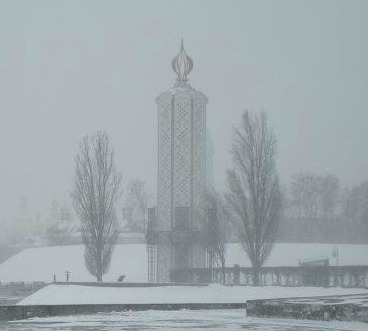Mr. Speaker, I am proud to be an original cosponsor of H. Res. 356. I thank and commend Mr. HYDE for introducing this resolution commemorating and honoring the memory of victims of an abominable act perpetrated against the people of Ukraine in 1932-33. Seventy years ago, millions of men, women and children were murdered by starvation so that one man, Soviet dictator Joseph Stalin, could consolidate control over Ukraine. The Ukrainian people resisted the Soviet policy of forced collectivization. The innocent died a horrific death at the hands of a tyrannical dictatorship which had crushed their freedom.
In an attempt to break the spirit of an independent-minded Ukrainian peasantry, and ultimately to secure collectivization, Stalin ordered the expropriation of all foodstuffs in the hands of the rural population. The grain was shipped to other areas of the Soviet Union or sold on the international market. Peasants who refused to turn over grain to the state were deported or executed. Without food or grain, mass starvation ensued. This manmade famine was the consequence of deliberate policies which aimed to destroy the political, cultural and human rights of the Ukrainian people.
In short, food was used as a weapon in what can only be described as an organized act of terrorism designed to suppress a people’s love of their land and the basic liberty to live as they choose.
Mr. Speaker, I recall back in the 1980s seeing the unforgettable movie, Harvest of Despair, which depicted the horrors of the Famine, as well as the fine work of the congressionally-created Ukraine Famine Commission, which issued its seminal report in 1988. Their work helped expose the truth about this horrific event. I am pleased that the resolution notes that there were those in the West, including The New York Times correspondent Walter Duranty, who knowingly and deliberately falsified their reports to cover up the Famine because they wanted to curry favor with one of the most evil regimes in the history of mankind.
The fact that this denial of the Famine took place then, and even much later by many scholars in the West is a shameful chapter in our own history.
Mr. Speaker, this is an important resolution which will help give recognition to one of the most horrific events in the last century in the hopes that mass-murders of this kind truly become unthinkable.
H. Res. 356
Whereas 2003 marks the 70th anniversary of the height of the famine in Ukraine that was deliberately initiated and enforced by the Soviet regime through the seizure of grain and the blockade of food shipments into the affected areas, as well as by forcibly preventing the starving population from leaving the region, for the purposes of eliminating resistance to the forced collectivization of agriculture and destroying Ukraine’s national identity;
Whereas this man-made famine resulted in the deaths of at least 5,000,000 men, women, and children in Ukraine and an estimated 1-2 million people in other regions;
Whereas the famine took place in the most productive agricultural area of the former Soviet Union while foodstocks throughout the country remained sufficient to prevent the famine and while the Soviet regime continued to export large quantities of grain;
Whereas many Western observers with first-hand knowledge of the famine, including The New York Times correspondent Walter Duranty, who was awarded a Pulitzer Prize in 1932 for his reporting from the Soviet Union, knowingly and deliberately falsified their reports to cover up and refute evidence of the famine in order to suppress criticism of the Soviet regime;
Whereas Western observers and scholars who reported accurately on the existence of the famine were subjected to disparagement and criticism in the West for their reporting of the famine;
Whereas the Soviet regime and many scholars in the West continued to deny the existence of the famine until the collapse of the Soviet regime in 1991 resulted in many of its archives being made accessible, thereby making possible the documentation of the premeditated nature of the famine and its harsh enforcement;
Whereas the final report of the United States Government’s Commission on the Ukraine Famine, established on December 13, 1985, concluded that the victims were “starved to death in a man-made famine” and that “Joseph Stalin and those around him committed genocide against Ukrainians in 1932-1933”; and
Whereas, although the Ukraine famine was one of the greatest losses of human life in the 20th century, it remains insufficiently known in the United States and in the world: Now, therefore, be it
Resolved, That it is the sense of the House of Representatives that–
(1) the millions of victims of the man-made famine that occurred in Ukraine in 1932-1933 should be solemnly remembered and honored in the 70th year marking the height of the famine;
(2) this man-made famine was designed and implemented by the Soviet regime as a deliberate act of terror and mass murder against the Ukrainian people;
(3) the decision of the Government of Ukraine and the Verkhovna Rada (the Ukrainian parliament) to give official recognition to the famine and its victims, as well as their efforts to secure greater international awareness and understanding of the famine, should be supported; and
(4) the official recognition of the famine by the Government of Ukraine and the Verkhovna Rada represents a significant step in the reestablishment of Ukraine’s national identity, the elimination of the legacy of the Soviet dictatorship, and the advancement of efforts to establish a democratic and free Ukraine that is fully integrated into the Western community of nations.









